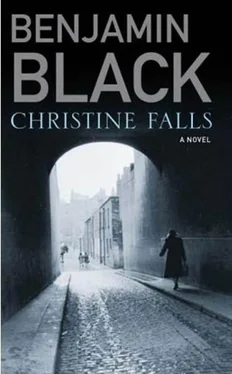He waited a moment, and then said, putting on now the lazy, good-old-boy version of his drawl:
“Why don’t you come and sit up here in front, with me?”
She gave a little gasp.
“I think,” she said, with all the weight and command she could muster, “that you should take me home.”
It was peculiar, talking to him like this, ridiculous, really, since all she could see of him was the crown of his cap. He snickered and said:
“Home? That’s a long way, even for a car as fancy as this one.”
“You know very well what I mean,” she snapped. “Come on, drive-and not as if we’re in a race.”
He straightened, taking his time, and started up the engine. At the next crossroads he steered them back in the direction of the coast. They did not speak now, but she could sense how pleased he was with himself. Had he really said that, about her coming into the front seat with him? Yet for all the indignation she was forcing herself to feel she was aware of another, altogether involuntary feeling, a sort of buzzing, burning sensation at the front of her mind that was uncomfortable and yet not entirely unpleasant, and her cheeks stung as if she had been slapped in a hard yet playful, provocative way. And when they arrived at the house and he made a little prancing leap out of the car in order to open the door for her before she had even begun to reach for the handle he gave her a look that was at once mocking, intimate, and inquiring, and she knew he was asking her wordlessly if she intended to tell the others-Quirke, Rose, his employer-of all that had taken place in this past, fraught hour-but what was it, exactly, that had taken place?-and try not to as she might she responded to his silent query with a silent reply of her own. No, she would not tell, and they both knew it. Blushing, her forehead and cheeks fairly on fire by now, she brushed past him, not daring to look into his eyes again, saying only, and trying to make it sound brusque and offhand, that he had better go back to the village and collect Mr. Quirke.
THE MAN WAS WAITING FOR HIM ON A CORNER OF THE VILLAGE’S MAIN street. He looked like a big old storm-tossed crow, leaning there on his stick with his black coat blowing out sideways in the wind and his black hat tilted down over his face. Andy got out and made to open the passenger door, hoping Quirke would sit beside him, but Quirke had already opened a rear door and was climbing into the back seat. There was something about Quirke that Andy liked, or that at least he respected-he guessed that was the word. Maybe it was just Quirke’s size-Andy’s father had been a big man-and they had hardly got under way again when he started to tell him about his plan for Stafford Limos. As he talked, the plan came to seem more and more possible, more and more real, so that after a while it was almost as if Stafford Limos was already in operation. Quirke did not say much, but that was all right since Andy, as Andy realized, was really talking to himself.
He was about to turn off the road and head for Moss Manor when Quirke interrupted him-he had got up to the Porsche that he was going to buy with his first six months’ profits from the limo scheme-and said that he wanted to go to Brookline.
“A place called St. Mary’s,” Quirke said. “It’s an orphanage.”
Andy said nothing, only turned the car. He felt a trickling sensation down his spine. He did not have to be told; he knew where and what St. Mary’s was. He had thought he would never again find himself anywhere near the place and now here was this guy wanting to be taken there. Why? Was he one of the Knights of Whatever-it-was, over from Ireland to do some checking up on the facilities, see how the kids were being cared for, if the nuns were behaving themselves? And was he going to go there without telling Mr. Crawford? Andy began to relax. That must be it: Quirke was a snoop. That was fine. He even liked the idea of Quirke getting the goods on old man Crawford and that bitch Stephanus-what kind of a name was that anyway?-and the harp priest Harkins. There was a thing or two Andy himself could have told Quirke, if it was not for the business with the kid. Again he felt that trickle along his backbone. What if Quirke found out about the kid dying? What if-but no. How would he find out, and who would tell him? Not Stephanus or the priest, and old Crawford probably knew nothing about the accident, and had probably even forgotten about the kid itself, since there were so many at St. Mary’s and at the other places all over the state. For everyone, little Christine was history, and her name was likely never going to be mentioned again. Still, it was a pity he could not let Quirke know just what sort of a joint St. Mary’s was-unless, of course, he knew already.
QUIRKE HAD NOT EXPECTED A RECEPTION PARTY. HE HAD TELEPHONED St. Mary’s from a bar in the village. He had been kept waiting on the line for a long time, feeding dimes into the phone and listening to his own breathing making sounds like the sea in the mouthpiece, before he was put through to the Mother Superior. In a crisply cold voice she had tried to establish who exactly he was and what his business with her might be. He told her his name, and said that he was staying at Josh Crawford’s house, and asked for ten minutes of her time, adding that the matter was a delicate one and that he would prefer not to speak of it over the phone. When she heard who he was he fancied he heard a quick indrawing of her breath. The more evasive he became the more suspicious she sounded, but in the end, and with lingering reluctance, she agreed that he might come to Brookline. He put down the phone and ordered another scotch: it was a little early in the day, but he needed to fortify himself.
WHEN HE STEPPED INSIDE THE HIGH, ARCHED DOORWAY OF ST. Mary’s he caught at once the unmistakable smell of the past and the years fell away like the leaves of a calendar and he was an orphan again. He stood in the silent hallway and looked at the statues in their niches of Mary and Jesus and Joseph-gentle Joe held what seemed to be a wood plane in his improbably pale hands and looked both resentful and resigned-until a young nun with front teeth so prominent they seemed almost prehensile led him along soundless corridors and stopped at a door and knocked softly and a voice spoke from within.
The Mother Superior, when she stood up behind her desk, was tall and gaunt and grimly handsome. It was the priest with her, however, who spoke first. He was potato-pale with pale-red hair and green eyes that were sharp yet muddy; Quirke knew the type, remembered it, from Carricklea days, and nights. The cleric came forward, smiling unctuously with his mouth only, a hand outstretched.
“Mr. Quirke,” he said. “I’m Father Harkins, chaplain here at St. Mary’s.” His eyelashes, Quirke saw with almost a shiver, were almost white. He took Quirke’s hand but instead of shaking it he drew him by it gently forward to the desk. “And this is Sister Stephanus. And Sister Anselm.”
Quirke had not noticed the other nun, standing off to his right, beside a vast, empty fireplace of marble and polished brick. She was short and broad, with a skeptical yet not, he thought, unsympathetic look. The two nuns nodded to him. Father Harkins, who seemed to have taken it on himself to be the spokesman, said:
“You’re Mr. Crawford’s son-in-law? Mr. Crawford is a great friend of ours-a great friend of St. Mary’s.”
Quirke was conscious of Sister Stephanus’s keen eye scanning him, like that of a fencing opponent, searching out his weak spots. The priest was about to speak again but the nun said:
“What can we do for you, Mr. Quirke?”
Hers was the voice of authority, and its tone told him who was really in charge here. Still she gazed at him, cool, candid, and even, it might be, a little amused. He fumbled his cigarettes from his pocket and lit one. Sister Stephanus, who had taken her seat again, pushed a large crystal ashtray to the front edge of the desk where he might more easily reach it. He asked about the child, saying her name would probably be Christine and that if she had a surname it was likely to be Falls. “I think she was brought here from Ireland,” he said. “I have reason to believe she came to St. Mary’s.”
Читать дальше












